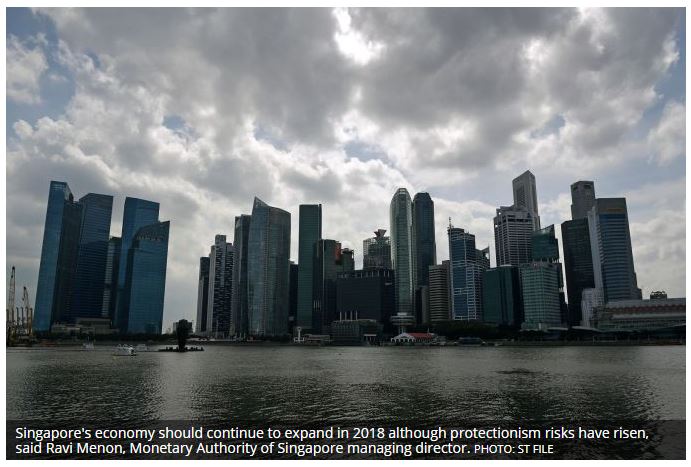Singapore’s economic growth to remain steady in 2018 despite rising trade friction: MAS chief Ravi Menon
SINGAPORE’s economy should continue to expand in 2018 although protectionism risks have risen, said Ravi Menon, Monetary Authority of Singapore managing director.
Overall growth in gross domestic product (GDP) is expected to come in at around 2.5–3.5 per cent in 2018, he said.
“While the central prognosis for the Singapore economy this year remains intact, spillovers from global trade conflicts bear close watching,” said Mr Menon, who was speaking on Wednesday at MAS’ annual report media briefing.
These spillovers arise from Singapore’s role as a node in the regional electronics production value-chain, as well as a hub for air and sea transport and financial intermediation services, he said.
Bilateral trade between the US and China indirectly contributes to about 1.1 per cent of Singapore’s GDP, said the MAS chief. Flows between the US and EU add another 0.5 per cent, while Nafta trade, which is between the US and Canada and Mexico, contributes 0.6 per cent, he added.
But “tail risks” to global growth have grown significantly over the last six months, said Mr Menon.
“Earlier this year, I described the “Goldilocks” state of the global economy – healthy growth, low inflation and easy financial conditions.
I had then also warned that the ‘three bears’—inflation, protectionism, and financial instability – could make an appearance any time to spoil the party,” he said.
“Six months later, we can say that at least two of the three bears have been sighted – inflation and protectionism.”
First, the risk of more rapid inflation has heightened, said Mr Menon. Inflation is on an upward path globally, and in the US has reached the Federal Reserve’s two per cent target amidst a tightening labour market. Accordingly, last month, the Fed indicated a faster pace of monetary policy normalisation.
“The expectation now is for two more rate hikes this year. But if inflation surprises on the upside, the Fed could be compelled to hike more,” said Mr Menon. “This would tighten global financial conditions by more than currently anticipated.”
Tighter global financial conditions could trigger market volatility and dampen corporate spending, said the MAS chief. As interest rates rise, some firms could face debt-servicing problems, especially in emerging market economies with relatively high levels of leverage, he said.
Besides the risk of faster rate hikes, two other developments threaten to tighten global financial conditions even more, said Mr Menon. These are the unwinding of the Fed’s balance sheet which withdraws US$ liquidity from global markets and the increased issuance of US Treasury bills to fund fiscal expansion, which accentuates tightness in US$ funding.
“We are already seeing some capital outflows from emerging market economies, alongside some tightness in US$ liquidity and funding markets. This is to be expected,” he said. “But if the withdrawal of US$ liquidity becomes more acute, some emerging market economies could face serious bouts of financial volatility.”
Mr Menon noted though that Asian economies are in a relatively stronger position to absorb these financial shocks.
He said: “Economic fundamentals in emerging Asian economies are stronger since the taper tantrum in 2013. Foreign reserves and bank capital buffers are larger while financial regulatory frameworks are more robust. And policymakers in Asia are more prepared to make macro-policy adjustments as needed, including pre-emptive interest rate hikes to support exchange rate stability.”
On rising protectionism, Mr Menon said: “Protectionism is rearing its ugly head on three trade fronts: US-China, US-EU and US-Mexico-Canada.
So far, the US has imposed tariffs on solar panels, washing machines, steel and aluminum imports from all major trading partners. It has announced tariffs of 25 per cent on US$50 billion of imports from China, and has threatened tariffs of 10 per cent on another US$200 billion of imports from China. Both China and Europe have announced retaliatory tariffs.
“The immediate effect of these trade restrictions is limited and does not threaten global growth – yet,” he said. “The real risks from the tariffs are spillover effects, escalation, and economic uncertainty— all of which could severely undermine global growth.
“If this escalates into a trade war, all three engines of global growth—manufacturing, trade, and investment – will stall.” he said.
The bottom line: The global economy is still in good shape but the momentum has started to flag and tail risks have grown, said Mr Menon
“So while global growth should be good this year, it may not be quite as good as last year,” he said.
Source: https://www.businesstimes.com.sg/government-economy/singapores-economic-growth-to-remain-steady-in-2018-despite-rising-trade-friction


 Thailand
Thailand




